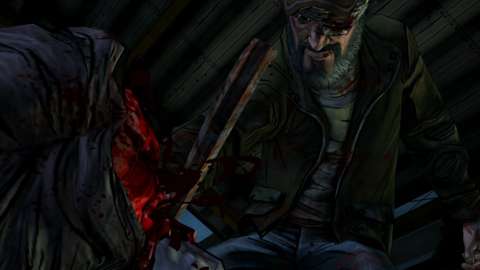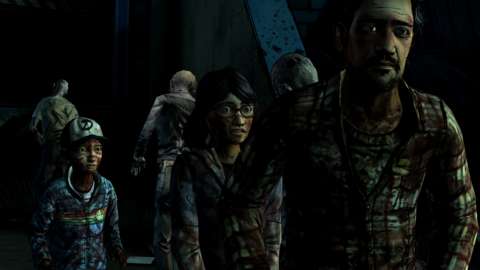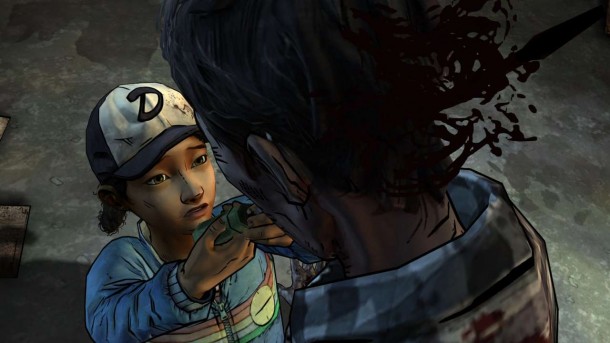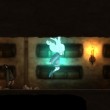The Walking Dead: Season 2 Episode 3 – In Harm’s Way Review
How far is this going to go? This is the question I kept asking myself during In Harm's Way, the third episode of the second season of Telltale Games' adventure series The Walking Dead. While the entire franchise has asked increasingly stressful moral questions about what you have to be willing to do to survive in a world of zombies and madmen always looking out for number one, the latest chapter takes you into such extreme, nihilistic territory that I started to worry about Clementine's soul, not just her skin.
In Harm's Way is one of the more pensive episodes of the season when it comes to exploring character motivation, although there is enough action--especially in the chaotic, bloody conclusion--that it's not exactly My Dinner With Andre. The story picks up right where it left off the last time around, with your band of plucky survivors led by Clem and Kenny in the clutches of the evil Bill Carver, commandant of a group that has set up shop in a very well-stocked former Lowe's, er, Howe's home improvement store. This gang has loads of food and supplies in their makeshift fortress, but also loads of automatic weapons and a dictatorial nutcase at the helm who, as we saw in the last episode, thinks nothing of killing anyone who doesn't agree with him.
As in the season's earlier episodes, and during most of last season, the plot revolves around Clem continually asking herself how far she is willing to go to help out her fellow survivors. Carver runs the Howe's like a prison camp, but there is no Sgt. Schultz for comic relief. This penitentiary comes complete with forced work details that include looking after walling out the undead and growing vegetables for food. You're placed into many situations where you decide how you're going to treat everyone else. Do you play nice and try to help out others who lack your intestinal fortitude? Or do you do your own thing and risk putting your pals in, you know, harm's way?
Gameplay is on the thin side, with little happening aside from a handful of action moves, but the many dialogue and motivation choices make for strong characterization and story development. Helping other people is the focus of most moral dilemmas, but choosing to do so almost always backfires to the point where someone is maimed or killed. Every personal problem brought me back to the scene in which a dog attacks Clem for a can of food--even if she tries to share it with the initially docile mutt--in an earlier episode. "No good deed goes unpunished" might as well be the subtitle for the whole series.

Here, the apparently docile mutt in question is Clem's new friend Sarah, who's still not adapting well to life on the run from zombies. There are many occasions when you can help her, ignore her, or tell her plainly that she's got to toughen up to survive. I always tried to help her out, to preserve some of Clem's fading empathy, while all along knowing that at some point Sarah was likely going to bite me, too.
The primary drawback with the storytelling is the black/white nature of most characters. Sarah is an annoying whiner; Kenny is devolving back to the old cattiness that made me want to see him dead by the second episode of the first season; and Luke is the earnest young guy who would be the member of the boy band that you would want to take home to meet mom. Others in the supporting cast are barely there. I can't even remember the names of the pregnant woman and the doctor. There is a real danger that characters are becoming too dispensable outside of a core group of two or three. You know Clem is going to make it, along with one or two of her closest companions, but beyond that, everyone might as well be wearing a red shirt and beaming down with Captain Kirk. Carver may be the weakest point. He's a murderous tyrant so openly monstrous that it's impossible to understand how he's still alive. There is this assumption that he's seen as a necessary evil, the bad guy needed to battle the even worse bad guys and monsters just outside the door. But he's really more of a grizzled tough-guy caricature spouting off Ayn Rand-style nonsense. A guy like this would have been shot in the head by one of his henchmen long ago.

Still, even the melodrama mostly works in In Harm's Way. The focus on Clem kept me invested, because even though I saw through some of the supporting cast, I was always concerned about her humanity, which was clearly being chipped away with every choice she made. The episode culminates by involving Clem with the most horrifying and explicit murder in the series so far. You are given a choice here, though. You can stay and watch the atrocity, which is then shown in gruesome detail, right down to the last swing of the crowbar, culminating in a scene so vicious that I was reminded of the torture scene from Grand Theft Auto V. Or you can leave and preserve a modicum of Clem's ability to relate to other human beings. I stayed and watched. Even after playing the nice guy throughout the entire episode, I had to stick around out of a perverse need to rubberneck...and, of course, to see just how far the game would go in depicting what was about to happen. If the world ever recovers, Clem is going to have a lot to share with her shrink.
Telltale Games' zombie extravaganza is continuing to prove that it is every bit the equal of the Robert Kirkman comics, and superior to the AMC TV show. In Harm's Way is a gameplay-light setup episode that mostly positions the characters for the conclusion of this season, but it also descends to new depths while exploring just how far Clementine and her allies are willing to go to stay alive. It's all sad and lonely and suicidally hopeless. But good luck trying to turn away.









